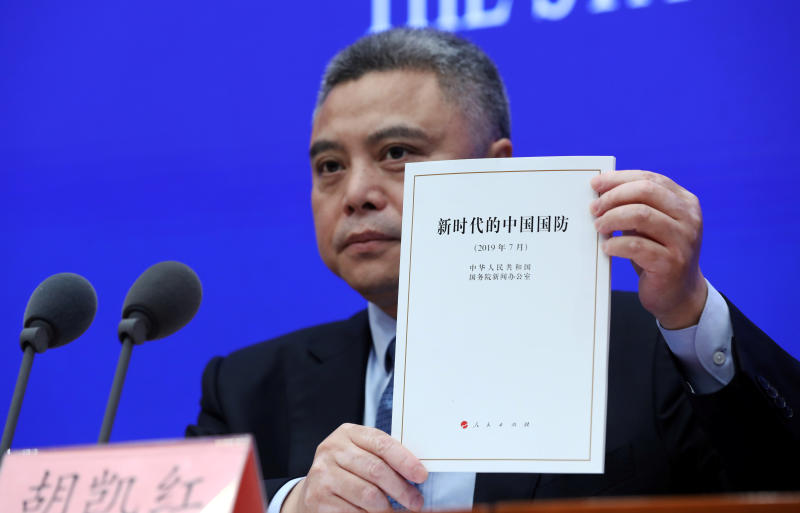China's defence White Paper emphasises growing military competition, homeland security
Sign up now: Get insights on Asia's fast-moving developments

Mr Hu Kaihong, spokesman for China's State Council Information Office, with a copy of the White Paper entitled "China’s National Defence in the New Era" during a news conference in Beijing on July 24, 2019.
PHOTO: REUTERS
BEIJING - China's latest defence White Paper places greater emphasis on the role its military plays in homeland defence and internal stability at a time of increased competition with the US, said experts.
The White Paper issued on Wednesday (July 24) - China's first since President Xi Jinping initiated a major overhaul of the People's Liberation Army (PLA) in 2015 - said China was among the countries in the world "with the most complex peripheral security environment".
Beijing blamed the US for having "provoked and intensified competition among major powers" by seeking to expand its capabilities in nuclear, cyber, missile defence and other areas, which it said had destabilised the world.
China also said its fight against separatists had grown "more acute", specifically calling out independence forces in Taiwan, Tibet and Xinjiang which threatened national security and social stability.
Observers said China's evolving military posture reflected growing rivalry with the US, which under the Trump administration has labelled China as a strategic competitor and revisionist power, and which has openly criticised Beijing's policies in Tibet and Xinjiang.
Shanghai-based military commentator Ni Lexiong noted that while Taiwan remained Beijing's key concern, it has also warned against external influence in other parts of the mainland.
"Besides Taiwan, US officials have been giving encouragement to independence forces in Tibet and Xinjiang, and this is Beijing issuing a warning, to both the domestic and international audience, that it will never compromise on national sovereignty," he said.
The White Paper also said that the PLA played an important role in protecting China's growing overseas interests, which Defence Ministry spokesman Wu Qian said did not contradict the official position that China's military was on the path of peaceful development.
"There is no contradiction... as China's military grows, it will bring greater security, and not threat, to the world," he told reporters.
The new White Paper also outlined China's position on the South China Sea and other maritime areas to a far greater extent than before.
While it mentioned increased dialogue with other claimant states over the disputed waters, the paper also stressed that the South China Sea islands were an inalienable part of Chinese territory, while also describing the PLA Navy's expanded capabilities to respond to security threats and provocations in those waters.
Maritime specialist Collin Koh, a research fellow at the S. Rajaratnam School of International Studies (RSIS), said the increased reference to the South China Sea reflected China's "growing angst" about how the situation in those waters would unfold in the future, given the increased military presence there by various nations in recent months.
Warships from France, Japan, Australia and the US held their first combined naval exercise in Asian waters in May, one week after vessels from the US, Japan, India and the Philippines held a joint exercise in the South China Sea.
"Notwithstanding the dialogues Beijing has with Asean, there're still upheavals that China found disturbing (such as) close brushes with rival claimants," said Dr Koh.
"The mention of the South China Sea is primarily designed as a forewarning to potential adversaries - other claimants and extra-regional powers - that it's resolved to safeguard its interests in those waters."
RSIS research fellow Wu Shang-su said the alternating "hawkish and dovish tones" on the South China Sea showed Beijing's intention to maintain flexibility on the issue, especially given the complex geostrategic situation.
"China may set the status quo as the baseline of the situation in the South China Sea, and hope regional countries accept, or at least not strongly challenge, this status quo," he said.


